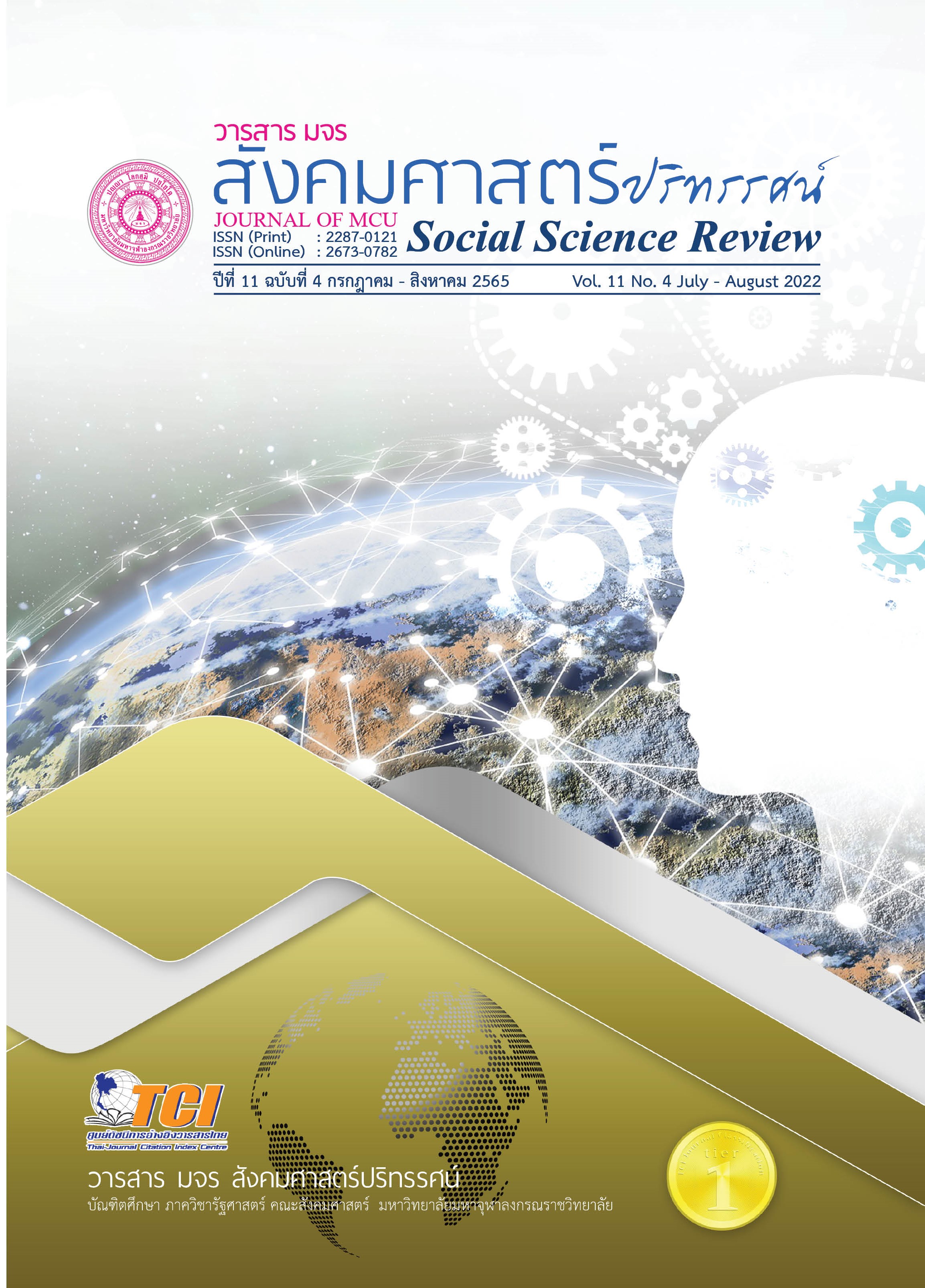การพัฒนารูปแบบการเรียนการสอนตามแนวคิดการเรียนรู้ด้วยกรณีศึกษาและการคิดอย่างมีวิจารณญาณเพื่อส่งเสริมความสามารถในการแก้ปัญหาเชิงสร้างสรรค์และผลสัมฤทธิ์ทางการเรียนของนักศึกษาครูสาขาวิชาสังคมศึกษา
คำสำคัญ:
รูปแบบการเรียนการสอน, แนวคิดการเรียนรู้ด้วยกรณีศึกษาและการคิดอย่างมีวิจารณญาณ, การแก้ปัญหาเชิงสร้างสรรค์บทคัดย่อ
บทความวิจัยนี้มีวัตถุประสงค์เพื่อ 1. พัฒนารูปแบบการเรียนการสอนตามแนวคิดการเรียนรู้ 2. ประเมินประสิทธิผลของรูปแบบการเรียนการสอนที่มีต่อความสามารถในการแก้ปัญหาเชิงสร้างสรรค์และผลสัมฤทธิ์ทางการเรียนของนักศึกษาครูสาขาวิชาสังคมศึกษา กลุ่มตัวอย่างนักศึกษาสาขาวิชาสังคมศึกษา 60 คน แบ่งกลุ่มทดลอง 30 คน และกลุ่มควบคุม 30 คน ระยะเวลาที่ใช้ในการทดลอง คือ 8 สัปดาห์ วิเคราะห์ข้อมูลโดยการหาค่าเฉลี่ย (Mean) ค่าส่วนเบี่ยงเบนมาตรฐาน (S.D.) และเปรียบเทียบผลการวิเคราะห์ข้อมูลด้วยสถิติทดสอบค่าที (t-test)
ผลการวิจัยพบว่า 1. รูปแบบการเรียนการสอนที่พัฒนามีองค์ประกอบหลัก 4 ประการ ได้แก่ หลักการ วัตถุประสงค์ กระบวนการเรียนการสอน และการวัดและประเมินผล รูปแบบนี้พัฒนาจากแนวคิดการเรียนรู้ด้วยกรณีศึกษาและการคิดอย่างมีวิจารณญาณ 2. ประสิทธิผลของรูปแบบการเรียนการสอนที่พัฒนาขึ้น พบว่า หลังการทดลองกลุ่มทดลองมีคะแนนเฉลี่ยความสามารถในการแก้ปัญหาเชิงสร้างสรรค์และผลสัมฤทธิ์ทางการเรียนสูงกว่ากลุ่มควบคุมอย่างมีนัยสำคัญ และกลุ่มทดลองมีคะแนนเฉลี่ยความสามารถในการแก้ปัญหาเชิงสร้างสรรค์และผลสัมฤทธิ์ทางการเรียนหลังการทดลองสูงกว่าก่อนการทดลองอย่างมีนัยสำคัญ จากบันทึกการเรียนรู้ พบว่า นักศึกษาครูสาขาวิชาสังคมศึกษาสามารถตัดสินใจเลือกวิธีการแก้ปัญหาตามบริบทของเนื้อหาวิชาสังคมศึกษาได้และชอบในกิจกรรมการเรียนรู้ของรูปแบบการเรียนการสอนนี้ ส่งผลให้ผลสัมฤทธิ์ทางการเรียนบรรลุตามวัตถุประสงค์
เอกสารอ้างอิง
เกรียงศักดิ์ เจริญวงศ์ศักดิ์. (2550). ผลกระทบโลกาภิวัตน์ต่อการจัดการศึกษาไทยในอีก 5 ปีข้างหน้า. กรุงเทพฯ: สำนักงานเลขาธิการสภาการศึกษา.
คณะกรรมการการศึกษาแห่งชาติ, สำนักงาน. (2540). ทฤษฏีการเรียนรู้เพื่อพัฒนากระบวนการคิด. กรุงเทพฯ: สำนักนายกรัฐมนตรี.
ชมพูนุช ร่วมชาติ. (2548). อนาคตภาพของหลักสูตรวิชาชีพครูในทศวรรษหน้า (พ.ศ. 2550-2559). (ปริญญานิพนธ์การศึกษาดุษฎีบัณฑิต สาขาวิชาการวิจัยและพัฒนาหลักสูตร). กรุงเทพฯ: มหาวิทยาลัยศรีนครินทรวิโรฒ.
ทิศนา แขมมณี. (2556). ศาสตร์การสอน องค์ความรู้เพื่อการจัดกระบวนการเรียนรู้ที่มีประสิทธิภาพ. (พิมพ์ครั้งที่ 17). กรุงเทพฯ: สำนักพิมพ์จุฬาลงกรณ์มหาวิทยาลัย.
พลกฤช ตันติยานุกูล. (2547). ผลของการจัดกิจกรรมการเรียนการสอนสังคมศึกษาด้วยการฝึกการคิดอย่างมีวิจารณญาณที่มีต่อผลสัมฤทธิ์ทางการเรียนและความสามารถในการแก้ปัญหาของนักเรียนชั้นมัธยมศึกษาปีที่ 1. (วิทยานิพนธ์ปริญญามหาบัณฑิต สาขาวิชาการสอนสังคมศึกษา). กรุงเทพฯ: จุฬาลงกรณ์มหาวิทยาลัย.
เพ็ญพนอ พ่วงแพ. (2557). การพัฒนารูปแบบการเรียนการสอนเพื่อส่งเสริมสมรรถนะการออกแบบกิจกรรมการเรียนรู้สังคมศึกษา สำหรับนักศึกษาวิชาชีพครู. (วิทยานิพนธ์ปริญญาดุษฎีบัณฑิต สาขาวิชาหลักสูตรและการสอน). นครปฐม: มหาวิทยาลัยศิลปากร.
เพียรพิทย์ โรจนปุณยา. (2558, 15 กันยายน). ประธานหลักสูตรครุศาสตรบัณฑิต สาขาวิชาสังคมศึกษา [บทสัมภาษณ์].
วันเพ็ญ สุลง. (2561). การเรียนรู้โดยใช้กรณีศึกษา เพื่อส่งเสริมการคิดวิเคราะห์ วิชาการบริหารงานคุณภาพในองค์การ ระดับประกาศนียบัตรวิชาชีพชั้นสูง ชั้นปีที่ 2. (วิทยานิพนธ์ปริญญาศึกษาศาสตรมหาบัณฑิต สาขาวิชาหลักสูตรและการสอน).กรุงเทพฯ: มหาวิทยาลัยธุรกิจบัณฑิตย์.
อารยา ช่ออังชัญ. (2553). การพัฒนารูปแบบการเรียนการสอนเพื่อส่งเสริมความสามารถในการคิดแก้ปัญหาอย่างมีวิจารณญาณกลุ่มสาระการเรียนรู้วิทยาศาสตร์ของนักเรียนชั้นประถมศึกษาปีที่ 5. (วิทยานิพนธ์ปริญญาดุษฎีบัณฑิต สาขาวิชาหลักสูตรและการสอน). นครปฐม: มหาวิทยาลัยศิลปากร.
Ennis, R.H. (1985). Logical Operation in Classroom. New York: Pergamon Press.
Joyce, B., and Weil, M. (2009). Models of teaching. (8th ed.). London: Allyn and Bacon.
Kurt, S. (2018). ADDIE Model: Instructional Design. Retrieved December 16, 2018, from https://educationaltechnology.net/the-addie-model-instructional-design
Mctighe, J. & Lyman, F. (1988). Cueing Thinking in the Classroom: The Promise of Theory-Embedded Tools. Educational Leadership, 42 (1), 26-36.
Moore, B.N. and Parker, R. (1986). Critical Thinking: Claims and Arguments in Everyday Life. California: Mayfield.
Treffinger, J. D., Isaksen, G. S., and Dorval, K. B. (2003). Creative problem solving: A contemporary framework for managing change. Retrieved March 15, 2014, from: http://cps.com
ดาวน์โหลด
เผยแพร่แล้ว
รูปแบบการอ้างอิง
ฉบับ
ประเภทบทความ
สัญญาอนุญาต
ลิขสิทธิ์ (c) 2022 วารสาร มจร สังคมศาสตร์ปริทรรศน์

อนุญาตภายใต้เงื่อนไข Creative Commons Attribution-NonCommercial-NoDerivatives 4.0 International License.
เพื่อให้เป็นไปตามกฎหมายลิขสิทธิ์ ผู้นิพนธ์ทุกท่านต้องลงลายมือชื่อในแบบฟอร์มใบมอบลิขสิทธิ์บทความให้แก่วารสารฯ พร้อมกับบทความต้นฉบับที่ได้แก้ไขครั้งสุดท้าย นอกจากนี้ ผู้นิพนธ์ทุกท่านต้องยืนยันว่าบทความต้นฉบับที่ส่งมาตีพิมพ์นั้น ได้ส่งมาตีพิมพ์เฉพาะในวารสาร มจร สังคมศาสตร์ปริทรรศน์ เพียงแห่งเดียวเท่านั้น หากมีการใช้ภาพหรือตารางหรือเนื้อหาอื่นๆ ของผู้นิพนธ์อื่นที่ปรากฏในสิ่งตีพิมพ์อื่นมาแล้ว ผู้นิพนธ์ต้องขออนุญาตเจ้าของลิขสิทธิ์ก่อน พร้อมทั้งแสดงหนังสือที่ได้รับการยินยอมต่อบรรณาธิการ ก่อนที่บทความจะได้รับการตีพิมพ์ หากไม่เป็นไปตามข้อกำหนดเบื้องต้น ทางวารสารจะถอดบทความของท่านออกโดยไม่มีข้อยกเว้นใดๆ ทั้งสิ้น





